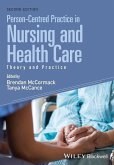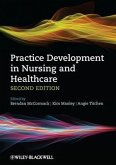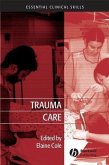Translating Chronic Illness Research into Practice (eBook, PDF)
Redaktion: Kralik, Debbie; Coates, Vivien; Paterson, Barbara
42,99 €
42,99 €
inkl. MwSt.
Sofort per Download lieferbar

0 °P sammeln
42,99 €
Als Download kaufen

42,99 €
inkl. MwSt.
Sofort per Download lieferbar

0 °P sammeln
Jetzt verschenken
Alle Infos zum eBook verschenken
42,99 €
inkl. MwSt.
Sofort per Download lieferbar
Alle Infos zum eBook verschenken

0 °P sammeln
Translating Chronic Illness Research into Practice (eBook, PDF)
Redaktion: Kralik, Debbie; Coates, Vivien; Paterson, Barbara
- Format: PDF
- Merkliste
- Auf die Merkliste
- Bewerten Bewerten
- Teilen
- Produkt teilen
- Produkterinnerung
- Produkterinnerung

Bitte loggen Sie sich zunächst in Ihr Kundenkonto ein oder registrieren Sie sich bei
bücher.de, um das eBook-Abo tolino select nutzen zu können.
Hier können Sie sich einloggen
Hier können Sie sich einloggen
Sie sind bereits eingeloggt. Klicken Sie auf 2. tolino select Abo, um fortzufahren.

Bitte loggen Sie sich zunächst in Ihr Kundenkonto ein oder registrieren Sie sich bei bücher.de, um das eBook-Abo tolino select nutzen zu können.
Translating Chronic Illness Research into Practice presents recent developments in chronic illness research and their implications for clinical practice. It delivers both a synthesis and a critique of current chronic illness research and its applications to chronic illness prevention, treatment and care. It promotes advances in knowledge about chronic illness, including discussion of the future directions for chronic illness research and gaps in present knowledge about effective chronic illness prevention, treatment and care.
Key features:
Contains contributions from internationally…mehr
- Geräte: PC
- mit Kopierschutz
- eBook Hilfe
- Größe: 1.16MB
Andere Kunden interessierten sich auch für
![Person-Centred Practice in Nursing and Health Care (eBook, PDF) Person-Centred Practice in Nursing and Health Care (eBook, PDF)]() Person-Centred Practice in Nursing and Health Care (eBook, PDF)35,99 €
Person-Centred Practice in Nursing and Health Care (eBook, PDF)35,99 €![Advanced Practice in Nursing and the Allied Health Professions (eBook, PDF) Advanced Practice in Nursing and the Allied Health Professions (eBook, PDF)]() Advanced Practice in Nursing and the Allied Health Professions (eBook, PDF)49,99 €
Advanced Practice in Nursing and the Allied Health Professions (eBook, PDF)49,99 €![Practice Development in Nursing and Healthcare (eBook, PDF) Practice Development in Nursing and Healthcare (eBook, PDF)]() Practice Development in Nursing and Healthcare (eBook, PDF)38,99 €
Practice Development in Nursing and Healthcare (eBook, PDF)38,99 €![Evidence-Based Clinical Practice in Nursing and Health Care (eBook, PDF) Evidence-Based Clinical Practice in Nursing and Health Care (eBook, PDF)]() Alan PearsonEvidence-Based Clinical Practice in Nursing and Health Care (eBook, PDF)53,99 €
Alan PearsonEvidence-Based Clinical Practice in Nursing and Health Care (eBook, PDF)53,99 €![Nursing Law and Ethics (eBook, PDF) Nursing Law and Ethics (eBook, PDF)]() Nursing Law and Ethics (eBook, PDF)37,99 €
Nursing Law and Ethics (eBook, PDF)37,99 €![Trauma Care (eBook, PDF) Trauma Care (eBook, PDF)]() Trauma Care (eBook, PDF)37,99 €
Trauma Care (eBook, PDF)37,99 €![Wellbeing Strategies for Nurses (eBook, PDF) Wellbeing Strategies for Nurses (eBook, PDF)]() Claire BoydWellbeing Strategies for Nurses (eBook, PDF)20,99 €
Claire BoydWellbeing Strategies for Nurses (eBook, PDF)20,99 €-
-
-
Translating Chronic Illness Research into Practice presents recent developments in chronic illness research and their implications for clinical practice. It delivers both a synthesis and a critique of current chronic illness research and its applications to chronic illness prevention, treatment and care. It promotes advances in knowledge about chronic illness, including discussion of the future directions for chronic illness research and gaps in present knowledge about effective chronic illness prevention, treatment and care.
Key features:
Key features:
- Contains contributions from internationally renowned researchers in chronic illness
- Focuses on three key concepts, translating research into practice, chronic illness and practice, and bridges the boundaries between them
- Is applicable to an international, multi-disciplinary readership
- For researchers and practitioners across health disciplines
Dieser Download kann aus rechtlichen Gründen nur mit Rechnungsadresse in D ausgeliefert werden.
Produktdetails
- Produktdetails
- Verlag: Wiley
- Erscheinungstermin: 5. Januar 2010
- Englisch
- ISBN-13: 9781444318692
- Artikelnr.: 38309140
- Verlag: Wiley
- Erscheinungstermin: 5. Januar 2010
- Englisch
- ISBN-13: 9781444318692
- Artikelnr.: 38309140
- Herstellerkennzeichnung Die Herstellerinformationen sind derzeit nicht verfügbar.
Debbie Kralik is General Manager, Strategy and Research at the Royal District Nursing Service in South Australia and Associate Professor, University of South Australia and Adelaide University. Barbara Paterson is Professor of Nursing and Tier 1 Canada Research Chair in the Faculty of Nursing, University of New Brunswick, Canada. Vivien Coates is Professor of Nursing Research, School of Nursing, University of Ulster & Assistant Director of Nursing, Western Health & Social Care Trust. (Joint appointment).
List of Contributors
Preface
1. Globalisation of Chronic Illness Research
Sally Wellard
Introduction
What is in a name?
Global crisis in chronic illness
Impact of chronic illness in developing nations
Trends in chronic illness research in developed nations
Policy drivers: taking action
Global initiatives for future chronic illness management
Conclusion
References
2. Transitional Processes and Chronic Illness
Debbie Kralik and Antonia van Loon
Introduction
The search
Defining transition
An emerging understanding of transition
Describing transition
Transition and identity
Transition and transformative learning
Transitional processes
A transition framework for practice
Conclusion
References
3. Translating Chronic Illness Research Across the Lifespan
Marit Kirkevold
Introduction
Human development across the lifespan
Key assumptions of the lifespan developmental perspective
Human development in old age
Applications of lifespan developmental perspectives in chronic illness
research
Supporting age-appropriate development without jeopardising the safe
management of serious chronic disease: the case of cystic fibrosis
Chronic illness in old age: providing developmentally appropriate
integrity-promoting care to persons suffering from dementia
Conclusions and implications
References
4. Assisting People with Chronic Illness toManage Co-Morbid Conditions
Allison Williams
Introduction
Conceptualising co-morbidity
Social determinants of co-morbidities
The medical paradigm
Health-care systems
Co-morbidity management
Models of chronic illness management
Conclusion
References
5. Conceptualisation of Self-Management
Malcolm Battersby, Sharon Lawn and Rene Pols
Introduction
Background to the use of the term self-management
Historical developments in self-management
Associated concepts or models that overlap with or inform self-management
Alternative definitions of self-management
Conclusions: the future for chronic condition self-management
References
6. The Relevance of Self-Management Programmes for People with Chronic
Disease at Risk for Disease-Related Complications
Barbara Paterson and Max Hopwood
Introduction
Background
Theoretical framework
Overview of relevant research
Sample
Participation
Attrition
Discussion
Conclusion
References
7. The Potential of Technology for Providing Social Support to People and
Families
David B. Nicholas
Introduction
Background
The Internet as a health resource
Impact of advanced technology in fostering therapeutic gain: overview of
relevant research
Social support delivery: considerations in selecting advanced technology
methods
Into the virtual future
References
8. Chronic Illness Research: TranslatingWhat We Know into What We Do
Renee F. Lyons, Lynn McIntyre, Grace Warner, Celeste Alvaro, Alastair
Buchan, Ian Reckless and Alison Kitson
Introduction
The task ahead
The dose-response problem
The promise of research
Knowledge translation: emerging from naïveté
Embedding KT within research agencies and grants
Web-based KT innovations
What chronic illness research gets taken up?
Policy containers and the future of chronic illness
The future of chronic illness: systems change using stroke examples
Conclusion
References
9. Future Directions
Debbie Kralik
Global perspective
Facilitating the will of the people
The evidence base
Technology and health promotion
Transition
Self-management and self-care
Health in the community
References
Index
Preface
1. Globalisation of Chronic Illness Research
Sally Wellard
Introduction
What is in a name?
Global crisis in chronic illness
Impact of chronic illness in developing nations
Trends in chronic illness research in developed nations
Policy drivers: taking action
Global initiatives for future chronic illness management
Conclusion
References
2. Transitional Processes and Chronic Illness
Debbie Kralik and Antonia van Loon
Introduction
The search
Defining transition
An emerging understanding of transition
Describing transition
Transition and identity
Transition and transformative learning
Transitional processes
A transition framework for practice
Conclusion
References
3. Translating Chronic Illness Research Across the Lifespan
Marit Kirkevold
Introduction
Human development across the lifespan
Key assumptions of the lifespan developmental perspective
Human development in old age
Applications of lifespan developmental perspectives in chronic illness
research
Supporting age-appropriate development without jeopardising the safe
management of serious chronic disease: the case of cystic fibrosis
Chronic illness in old age: providing developmentally appropriate
integrity-promoting care to persons suffering from dementia
Conclusions and implications
References
4. Assisting People with Chronic Illness toManage Co-Morbid Conditions
Allison Williams
Introduction
Conceptualising co-morbidity
Social determinants of co-morbidities
The medical paradigm
Health-care systems
Co-morbidity management
Models of chronic illness management
Conclusion
References
5. Conceptualisation of Self-Management
Malcolm Battersby, Sharon Lawn and Rene Pols
Introduction
Background to the use of the term self-management
Historical developments in self-management
Associated concepts or models that overlap with or inform self-management
Alternative definitions of self-management
Conclusions: the future for chronic condition self-management
References
6. The Relevance of Self-Management Programmes for People with Chronic
Disease at Risk for Disease-Related Complications
Barbara Paterson and Max Hopwood
Introduction
Background
Theoretical framework
Overview of relevant research
Sample
Participation
Attrition
Discussion
Conclusion
References
7. The Potential of Technology for Providing Social Support to People and
Families
David B. Nicholas
Introduction
Background
The Internet as a health resource
Impact of advanced technology in fostering therapeutic gain: overview of
relevant research
Social support delivery: considerations in selecting advanced technology
methods
Into the virtual future
References
8. Chronic Illness Research: TranslatingWhat We Know into What We Do
Renee F. Lyons, Lynn McIntyre, Grace Warner, Celeste Alvaro, Alastair
Buchan, Ian Reckless and Alison Kitson
Introduction
The task ahead
The dose-response problem
The promise of research
Knowledge translation: emerging from naïveté
Embedding KT within research agencies and grants
Web-based KT innovations
What chronic illness research gets taken up?
Policy containers and the future of chronic illness
The future of chronic illness: systems change using stroke examples
Conclusion
References
9. Future Directions
Debbie Kralik
Global perspective
Facilitating the will of the people
The evidence base
Technology and health promotion
Transition
Self-management and self-care
Health in the community
References
Index
List of Contributors
Preface
1. Globalisation of Chronic Illness Research
Sally Wellard
Introduction
What is in a name?
Global crisis in chronic illness
Impact of chronic illness in developing nations
Trends in chronic illness research in developed nations
Policy drivers: taking action
Global initiatives for future chronic illness management
Conclusion
References
2. Transitional Processes and Chronic Illness
Debbie Kralik and Antonia van Loon
Introduction
The search
Defining transition
An emerging understanding of transition
Describing transition
Transition and identity
Transition and transformative learning
Transitional processes
A transition framework for practice
Conclusion
References
3. Translating Chronic Illness Research Across the Lifespan
Marit Kirkevold
Introduction
Human development across the lifespan
Key assumptions of the lifespan developmental perspective
Human development in old age
Applications of lifespan developmental perspectives in chronic illness
research
Supporting age-appropriate development without jeopardising the safe
management of serious chronic disease: the case of cystic fibrosis
Chronic illness in old age: providing developmentally appropriate
integrity-promoting care to persons suffering from dementia
Conclusions and implications
References
4. Assisting People with Chronic Illness toManage Co-Morbid Conditions
Allison Williams
Introduction
Conceptualising co-morbidity
Social determinants of co-morbidities
The medical paradigm
Health-care systems
Co-morbidity management
Models of chronic illness management
Conclusion
References
5. Conceptualisation of Self-Management
Malcolm Battersby, Sharon Lawn and Rene Pols
Introduction
Background to the use of the term self-management
Historical developments in self-management
Associated concepts or models that overlap with or inform self-management
Alternative definitions of self-management
Conclusions: the future for chronic condition self-management
References
6. The Relevance of Self-Management Programmes for People with Chronic
Disease at Risk for Disease-Related Complications
Barbara Paterson and Max Hopwood
Introduction
Background
Theoretical framework
Overview of relevant research
Sample
Participation
Attrition
Discussion
Conclusion
References
7. The Potential of Technology for Providing Social Support to People and
Families
David B. Nicholas
Introduction
Background
The Internet as a health resource
Impact of advanced technology in fostering therapeutic gain: overview of
relevant research
Social support delivery: considerations in selecting advanced technology
methods
Into the virtual future
References
8. Chronic Illness Research: TranslatingWhat We Know into What We Do
Renee F. Lyons, Lynn McIntyre, Grace Warner, Celeste Alvaro, Alastair
Buchan, Ian Reckless and Alison Kitson
Introduction
The task ahead
The dose-response problem
The promise of research
Knowledge translation: emerging from naïveté
Embedding KT within research agencies and grants
Web-based KT innovations
What chronic illness research gets taken up?
Policy containers and the future of chronic illness
The future of chronic illness: systems change using stroke examples
Conclusion
References
9. Future Directions
Debbie Kralik
Global perspective
Facilitating the will of the people
The evidence base
Technology and health promotion
Transition
Self-management and self-care
Health in the community
References
Index
Preface
1. Globalisation of Chronic Illness Research
Sally Wellard
Introduction
What is in a name?
Global crisis in chronic illness
Impact of chronic illness in developing nations
Trends in chronic illness research in developed nations
Policy drivers: taking action
Global initiatives for future chronic illness management
Conclusion
References
2. Transitional Processes and Chronic Illness
Debbie Kralik and Antonia van Loon
Introduction
The search
Defining transition
An emerging understanding of transition
Describing transition
Transition and identity
Transition and transformative learning
Transitional processes
A transition framework for practice
Conclusion
References
3. Translating Chronic Illness Research Across the Lifespan
Marit Kirkevold
Introduction
Human development across the lifespan
Key assumptions of the lifespan developmental perspective
Human development in old age
Applications of lifespan developmental perspectives in chronic illness
research
Supporting age-appropriate development without jeopardising the safe
management of serious chronic disease: the case of cystic fibrosis
Chronic illness in old age: providing developmentally appropriate
integrity-promoting care to persons suffering from dementia
Conclusions and implications
References
4. Assisting People with Chronic Illness toManage Co-Morbid Conditions
Allison Williams
Introduction
Conceptualising co-morbidity
Social determinants of co-morbidities
The medical paradigm
Health-care systems
Co-morbidity management
Models of chronic illness management
Conclusion
References
5. Conceptualisation of Self-Management
Malcolm Battersby, Sharon Lawn and Rene Pols
Introduction
Background to the use of the term self-management
Historical developments in self-management
Associated concepts or models that overlap with or inform self-management
Alternative definitions of self-management
Conclusions: the future for chronic condition self-management
References
6. The Relevance of Self-Management Programmes for People with Chronic
Disease at Risk for Disease-Related Complications
Barbara Paterson and Max Hopwood
Introduction
Background
Theoretical framework
Overview of relevant research
Sample
Participation
Attrition
Discussion
Conclusion
References
7. The Potential of Technology for Providing Social Support to People and
Families
David B. Nicholas
Introduction
Background
The Internet as a health resource
Impact of advanced technology in fostering therapeutic gain: overview of
relevant research
Social support delivery: considerations in selecting advanced technology
methods
Into the virtual future
References
8. Chronic Illness Research: TranslatingWhat We Know into What We Do
Renee F. Lyons, Lynn McIntyre, Grace Warner, Celeste Alvaro, Alastair
Buchan, Ian Reckless and Alison Kitson
Introduction
The task ahead
The dose-response problem
The promise of research
Knowledge translation: emerging from naïveté
Embedding KT within research agencies and grants
Web-based KT innovations
What chronic illness research gets taken up?
Policy containers and the future of chronic illness
The future of chronic illness: systems change using stroke examples
Conclusion
References
9. Future Directions
Debbie Kralik
Global perspective
Facilitating the will of the people
The evidence base
Technology and health promotion
Transition
Self-management and self-care
Health in the community
References
Index







